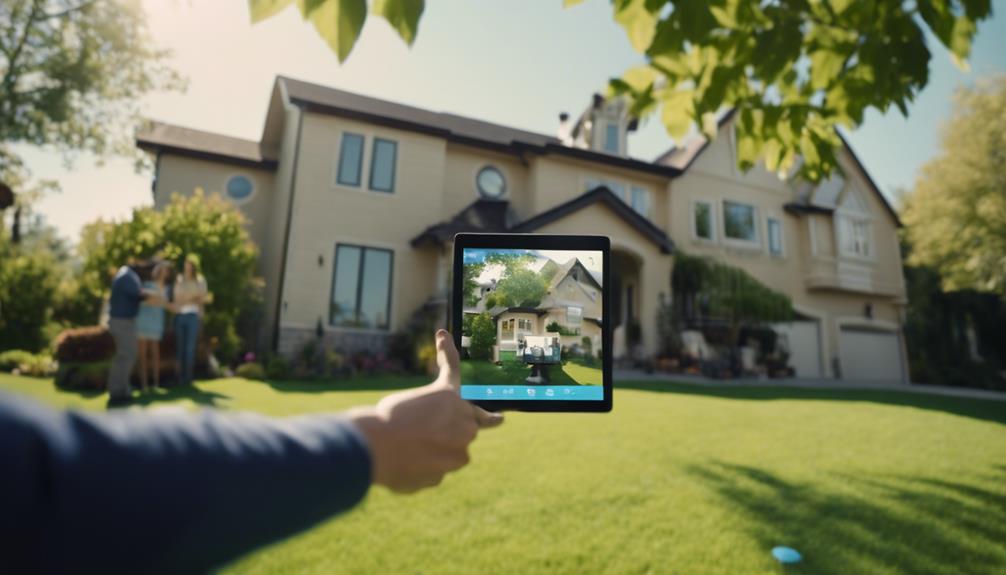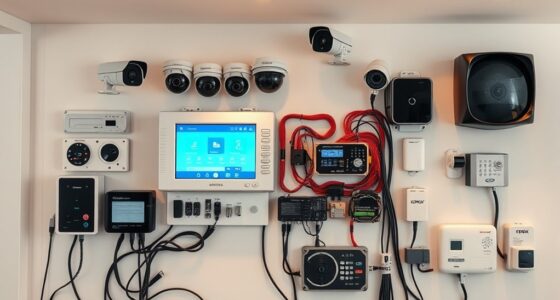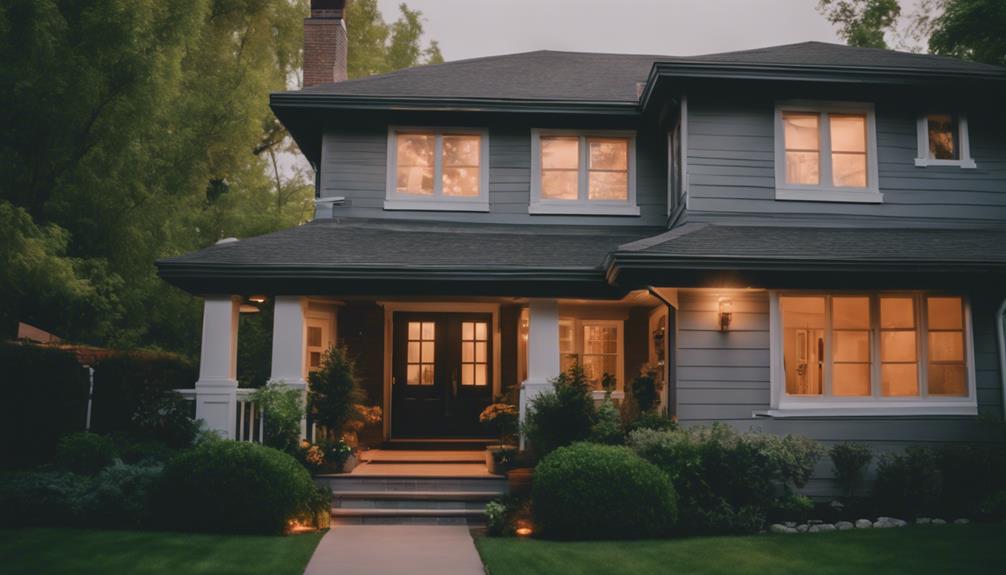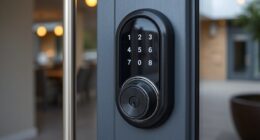Home security systems no longer require a landline. Nowadays, most modern systems utilize cellular networks or internet connections for alerts and monitoring. This transition boosts reliability and simplifies installation, enabling easier connectivity to your home even when you’re on the move. By choosing monitoring through smartphones or incorporating smart home technology, you can experience enhanced convenience and security. Additionally, cellular systems deliver alerts more quickly than traditional landline setups. If you’re interested in learning more about selecting the ideal system for your requirements, there is a wealth of information to delve into.
Key Takeaways
- Modern home security systems do not require a landline; they utilize cellular, internet, or VoIP connections for alerts and monitoring.
- Cellular monitoring systems are more reliable and faster in alerting homeowners compared to traditional landline systems.
- Wireless security systems simplify installation and enhance performance without the need for landlines.
- Internet-based systems can be effective but may experience outages, making cellular systems a more dependable choice.
Overview of Home Security Systems
Home security systems have transformed over the years, adapting to the decline of landline usage and embracing modern technologies for enhanced safety and convenience. Today, only about 40% of adult Americans still rely on landlines, prompting a shift toward cellular and internet-based systems.
These modern solutions utilize cellular networks for alert transmission and real-time monitoring, ensuring you stay connected and informed. Additionally, just as air purifiers improve indoor air quality, home security systems enhance the safety of your living environment by offering advanced monitoring options.
Top alarm companies now provide thorough wireless security systems that eliminate the need for traditional landlines. This shift not only simplifies installation but also enhances reliability.
Many systems integrate seamlessly with smart home technology, allowing you to control your security features through your smartphone or other devices, providing an added layer of convenience.
Whether you opt for a professional monitoring service or choose a DIY system, you'll find a range of options that suit your specific needs. The decline of landline usage has ushered in an era of innovative security solutions, making it easier than ever to protect your home and loved ones.
With faster alert transmission and advanced monitoring capabilities, modern home security systems offer peace of mind like never before.
Functionality of Non-Landline Systems

Non-landline security systems offer flexibility and reliability by utilizing cellular, internet, or VoIP connections to transmit alerts instantly. With cellular monitoring, you receive real-time notifications directly to your smartphone, ensuring immediate reporting of any breaches or emergencies. This is a significant advantage over traditional systems that rely on landlines, as it enhances user experience by providing seamless connectivity and control.
Internet-based systems leverage Wi-Fi and cellular technology, allowing for faster alert transmission and seamless integration with smart home devices. This means you can control and monitor your security system from anywhere, enhancing your home's safety. VoIP systems also provide communication options, but they may falter during power outages, making them less reliable without backup.
Many modern alternatives function without a landline, reflecting today's communication trends. These systems often include cellular backup options, ensuring your home remains protected even if the power goes out.
The flexible communication capabilities of non-landline security systems empower you to stay connected and informed regardless of your location. This versatility not only enhances security but also aligns with your lifestyle, giving you peace of mind knowing your home is monitored 24/7.
Comparison of Security System Types

When comparing security system types, it's essential to evaluate how each option's communication method impacts reliability, costs, and overall effectiveness.
Landline security systems depend on traditional phone lines, which can be less reliable, especially during power outages. In contrast, hackathon trends have shown that cellular security systems utilize a cellular connection, providing quicker alerts and more robust connectivity. This makes them increasingly popular in today's tech-savvy world.
When it comes to monthly monitoring costs, landline systems typically range from $10 to $30, while cellular systems average between $40 to $60. Although cellular options are pricier, they often offer better features, such as compatibility with smart home devices.
You might also consider internet-based security systems, which rely on Wi-Fi or Ethernet. While they can be cost-effective, they're more prone to outages, making them potentially less reliable than their cellular counterparts.
If you're exploring DIY security, remember that each type has its pros and cons. Ultimately, the choice between landline and cellular security systems will depend on your specific needs and priorities, especially regarding reliability and connectivity.
Recommendations for Choosing a System

Choosing the right security system involves weighing factors like reliability, installation options, and monitoring costs to find a solution that suits your needs. Consider opting for a cellular system, as it offers enhanced reliability and faster alert transmission compared to traditional landline monitoring.
Here's a quick comparison to help you decide:
| Feature | Cellular Service | Landline Monitoring |
|---|---|---|
| Reliability | High | Moderate |
| Installation Options | Flexible installation | Professional installation |
| Backup Options | Cellular/battery backups | Limited |
| Monitoring Cost | Varies, often flexible | Typically fixed |
| Smart Locks | Compatible | Usually not |
Evaluate the quality of security cameras and sensors included, as these are critical for effective monitoring. Wireless signals can enhance the system's performance, allowing for easy installation without the need for extensive wiring. Additionally, look for systems that provide flexible installation options, whether DIY or professional, to fit your lifestyle. Always review contract lengths and monitoring costs to guarantee you have a solution that meets your needs without being locked into a long-term commitment.
Common Questions and Vulnerabilities

Many homeowners wonder about the vulnerabilities of modern security systems and whether they truly need a landline for reliable protection.
Today's security systems use cellular data, internet, or VoIP connections, making them more efficient than traditional landline systems. In fact, cellular systems transmit alerts faster than landline options and provide better security against tampering since phone lines can be physically damaged.
Additionally, implementing reliable hydration strategies can help optimize your overall home safety awareness.
A common question you might've concerns the vulnerabilities associated with cellular systems. While it's true that cellular jamming can occur, such incidents are rare and typically don't pose a considerable threat compared to the likelihood of forced entry burglaries. Furthermore, maintaining a landline can be a financial burden, so shifting to a landline-free system can help you save money.
Modern home security solutions connect directly to a monitoring center, ensuring prompt response during emergencies, even during power outages.
As only 40% of adult Americans still keep a landline, it's clear that homeowners are moving towards more reliable, wireless systems.
Embracing these advancements can greatly enhance your home security while addressing common concerns.
Frequently Asked Questions
Can You Have a Home Security System Without a Landline?
Yes, you can have a home security system without a landline. Modern systems use cellular or internet connections for monitoring and alerts, making them more reliable and often more cost-effective than traditional landline-based options.
Is a Landline Required for Adt?
Why cling to outdated technology? You won't need a landline for ADT's security systems. They utilize cellular and internet connections, ensuring reliable monitoring and communication, even during power outages, giving you peace of mind.
Does Ring Alarm Need a Landline?
No, the Ring Alarm doesn't need a landline. It uses wireless signals, connecting via Wi-Fi or cellular networks. You can easily install it yourself and enjoy flexible monitoring options without traditional wiring hassles.
What Is Required for a Home Security System?
What do you need for a home security system? You'll require quality sensors, a control panel, and possibly a monitoring service. Plus, consider backup options like cellular connections to guarantee continuous protection during outages.
Are There Home Security Systems That Do Not Require Internet?
Yes, there are home security systems that do not require internet for home security systems. These systems typically use a cellular connection or landline to communicate with monitoring centers. This is especially useful for areas with unreliable internet or for homeowners who want a non-internet reliant system.
Is a Landline Necessary for Home Security Systems to Avoid Jamming?
When it comes to home security, many wonder if a landline is necessary to avoid wireless home security systems jammed by potential intruders. While landlines can provide a dedicated connection, modern wireless systems have advanced technology to prevent jamming and offer reliable security without the need for a landline.
Can Ring Doorbell Security be Integrated with a Home Security System Without a Landline?
Yes, you can secure your ring doorbell without a landline by integrating it with a home security system. Many security systems offer wireless integration with Ring Doorbells, allowing you to monitor and control your doorbell through the same system that protects your home.
Conclusion
In today's tech-savvy world, you don't need a landline for a reliable home security system.
Think of it like a smartphone; it keeps you connected and protected without being tethered to a wall.
Many systems now use cellular or Wi-Fi connections, ensuring you're always in touch, even during a power outage.
When choosing your system, consider your lifestyle and comfort.
A little research can help you find the perfect fit to safeguard your home and peace of mind.









